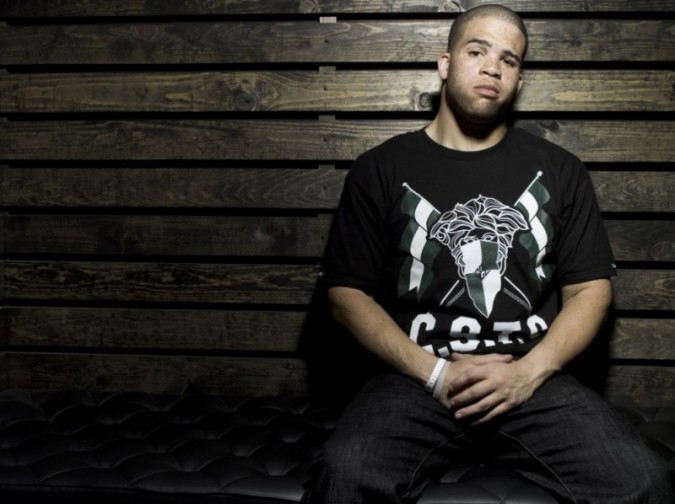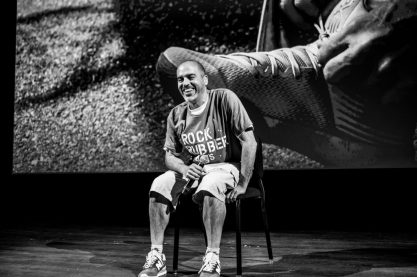Interviews
INTERVIEW: Dawaun Parker Talks Musical Inspiration And Execution

Very few people realize the many hands that can be involved in producing a hit records these days. Truth is, standing behind most super-producers is a sidekick providing support and inspiration at a moment’s notice. Some are even awaiting the chance to step out of the shadows into their own spotlight. Poised for that move is Dawaun Parker (D-Park), the protégé of legendary producer Dr. Dre. D-Park is set to release “The Decision,” his debut EP, where he not only showcases his production skills but his ability to MC as well. The EP will be released on High Renaissance, his own imprint.
Born and raised in Rhode Island, which probably isn’t typical of most hip-hop producers, his route to success isn’t typical either. Like many hip-hop heads he grew up on a steady diet of Yo’ MTV raps and PE tapes, but after graduating from high school, instead of burying himself in a basement honing his musical prowess, D-Park chose to attend Berklee School Of Music – a school whose curriculum isn’t the least bit hip hop centric. It was a move some people around him criticized, but a path he felt was the right for him.
It is this make up – a devout love of hip-hop and a traditional musical education – that makes D-Park’s style of music and career what it is. A large part of that career has been working under Dr. Dre, whose influence is clearly stated in his music as well. He has assisted Dre on several projects including the “Get Rich and Die Trying Soundtrack,” Jay-Z’s “Kingdom Come” album, Busta Rhymes “Big Bang Theory” album, and more. D-Park sat down with the Couch Sessions to talk about the musical choices he’s made, past to present.
How did you first get into music?
I can remember getting into Yo’ MTV raps and just all the stuff they were playing like “Self Destruction” and “We Are All in the Same Gang” videos and just really rocking my PE tape to death, and that’s where the whole love affair with the culture and love of hip hop and everything started.
Is there a pivotal record or song that you heard as a kid that made you say to yourself “I want to do this? I want to be in music”?
Busta Rhymes’ first album “The Coming.” There was this track #10 called “Still Shinning” that the Ummah produced that I found out was Jay Dee and when I heard that beat, man, I almost screamed! What is going on?! And the chords! And then there was the one part where Busta Rhymes says something and they changed the kick drum to match the pattern of his rap, and I knew that was after the fact and it is was just so incredible to me. And when I saw that beat I used to wish I made that joint. And when I started looking up the Uumah and I found out Dilla was a part of that I started finding everything that I could and every time I saw a [Dilla] track on the record it was my favorite track on the record. And so it was pretty much between that and the “Woo-Ha” maxi-single… [It] had two instrumentals on there, I think one was by Clark Kent and the other was by Dilla. The instrumental to the remix, I always wished I made that beat too. I was like, “yo, he stole my beat idea! This is what I would do!” From then on I was like this is kind of what I want to do I want to make beats. It was a couple of years from that point to when I got equipment or I was able to try out somebody’s equipment but that was the on set.
Did you find it difficult to incorporate the traditional music knowledge you gained at Berklee into your work being that hip-hop is such a non-traditional form of music?
I knew [Berklee] didn’t have any production classes there, I wasn’t looking for that. And I knew that probably, and this may be a little arrogant, there wouldn’t be anybody there who knew more about hip-hop than me at all because I was that much of a student of it and that much of a fan. I didn’t need that to be present at Berkley in order for me to go there I just wanted everything else that it had and me try to apply it to my thing.
How do you balance your own free creative expression when working under the direction of Dr. Dre?
Initially I just wanted to do what I was told, and then you realize further and further on that you are being looked to to provide ideas and inspiration.
Dre might be like, “I was just driving over here and I heard this old school song and we should do something in this vibe,” and then it’s, “how do we approach this?” Doc might say something like, “find some strings.” But he doesn’t say anything other than that. I’m still like I need to find “the” strings, I need to find “the” part, I need to come up with that aspect of it. Now just as soon as I hear whatever I feel I’ll just go and add it and then give a glance or be like, “is this wack or not? … Do you hate this or not?”
Dre makes the final call, but I have no problem saying we should do this or this should come here because it sounds iller to me. Or, I think this will be dope or I think we’ll still achieve the vibe we’re trying to with this. My words are always considered and that’s all I could ask for.
What are some important things you have learned while working under Dre?
I know a lot about just running a session and trying to make sure you get what your goal was when you got to the session. That you leave with that goal you know even with everything that comes along with it. With the partying and everyone wanting to have a good time and it be about vibe and that whole thing. Doc still finds a way where that environment can happen and everything still gets done, if he’s around it all gets done. Not settling for anything, always wondering if there is something else we can do that will make this better and will really put it over the top.
Can you talk a bit about your process for coming up with ideas for your own music?
There is no formula. Most of the time it comes from listening to something. I’m listening to some NPR or scrolling through some oldies and I’ll hear some vibe that makes me think of something. Every now and then it’s a new rap tune and I’ll like what the drums is doing but I don’t like anything else on the record. And I’ll be like damn this drum, but then you put this on top maybe that can be an idea. So sometimes when I get stuck I just listen to the first drum loop I like and then I’ll try to recreate that or do something similar and then do your own thing. And by the time you do your own thing it took such a left turn from what it originally started out anyway. You just want something to get you pass the creative wall.
Are you one of those people who are studio obsessed that can never leave the studio?
No, not at all. My inspiration… I’ve gotta’ step out, go talk to a friend, or go play ball, or go hear some dope music. Or, if I’m in the studio, I’ve got to have people come by and just chop it up. I do need to get that from people more than I ever thought before. I’m kind of a loner in my life, but I make music not only because I love it, but cause I want to connect with people. I want to connect with the world so that desire for me to have things that are palatable with people, so I need people around to judge that.
What is the message you want to convey to fans, new and old, with this first project?
“The Decision EP” is more or less an introduction to D-Park the artist. I think that any old fans of my production will definitely hear some commonalities with the sound, but it’s different than what I’ve done for other artists, more musical for sure. While not necessarily a biographical project, because I’m saving some of those records for the actual album, it will go into some of who I am and that I’ve decided to also express myself thru rap at this time. The EP’s title refers to the theme, the proverbial fork in the road, the blessing [and] burden of having options”.
Check out this leak from D-Park’s “The Decision EP” -- “Lowerrr”.
